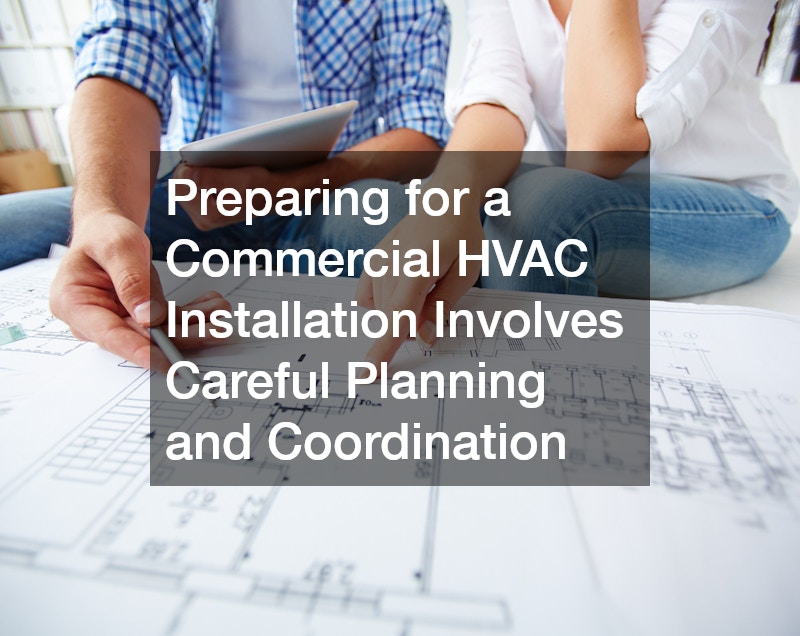Installing a commercial HVAC system is a significant investment and a pivotal step towards enhancing indoor air quality and overall comfort. Proper preparation is crucial to ensure a smooth installation process and optimal performance of the system. This guide provides insights into essential considerations and steps to prepare your building for a successful commercial HVAC installation.
What are the Preliminary Steps for HVAC Installation Preparation?
Conducting a Building Assessment
Before installing an HVAC system, it’s crucial to evaluate the existing conditions of the building. This assessment should include structural integrity checks, the current state of the building envelope, and potential challenges that may arise during installation.
Identifying areas that may require reinforcement or modification can save time and resources in the long run. It is also essential to consult with industry professionals to ensure a thorough and accurate assessment.
Consider the building’s age and any existing infrastructure that can interfere with the HVAC installation. A comprehensive building assessment serves as the foundation for a successful installation project.
Identifying Specific HVAC Needs
Understanding the unique HVAC needs of your building is vital for selecting the right system. Factors such as the size of the space, number of occupants, and specific climate requirements must be considered to tailor the installation effectively.
Different commercial spaces may have varying heating and cooling demands, depending on their function and location. Identifying these requirements helps in choosing an HVAC system that ensures optimal performance and energy efficiency.
Collaborate with HVAC professionals to explore different system options and configurations. This preparation phase is crucial in avoiding costly adjustments or upgrades in the future.
How to Choose the Right HVAC Installer?
Evaluating Installer Credentials
Research and verify the credentials of potential HVAC installers to ensure technical proficiency. Look for certifications, licenses, and relevant experience in installing commercial HVAC systems to select a qualified professional.
An experienced installer can provide valuable insights and recommendations that cater to the specific needs of your building. Their expertise in handling complex installations is pivotal for avoiding common pitfalls during the process.
Consider installers who are well-versed in the latest HVAC technologies and trends. Staying updated with industry standards ensures that the installation meets all regulatory requirements.
Reviewing Past Work and Client Feedback
Examine the installer’s portfolio and read testimonials or reviews from previous clients. This can provide insight into their reliability, work quality, and customer satisfaction levels.
Client feedback often highlights aspects of the installer’s service that may not be immediately apparent from credentials alone. Such insights can be invaluable in making an informed decision.
Consider reaching out to past clients for direct feedback regarding their experiences. This can confirm the installer’s track record and reveal how they handle challenges in real-world scenarios.
What to Expect During the Installation Process?
Preparing the Installation Site
Clear and accessible work areas are essential for an efficient HVAC installation process. Make arrangements for the installation team to have clear access to the site, removing any obstructions such as furniture or equipment.
Ensure the site is safe and free from hazards that could impede the installation process. This not only protects the installation team but also safeguards your property.
Effective communication with the installation team helps coordinate logistics and timelines, minimizing disruption to building operations. Preparation is key to facilitating a smooth and efficient installation.
Understanding the Installation Timeline
Having a clear understanding of the expected timeline for the installation process is crucial. It aids in managing expectations and planning around potential disruptions to building functions.
Discuss the timeline in detail with the HVAC installer and develop a schedule that accommodates your building’s operations. This ensures the least possible inconvenience to occupants and stakeholders.
Knowledge of the project timeline allows for proactive planning and resource allocation, minimizing delays or unexpected challenges. Timeliness contributes significantly to a successful HVAC installation.
How to Maintain Your HVAC System Post-Installation?
Regular Maintenance Checks
Establishing a routine for regular maintenance checks is crucial in maximizing the efficiency and performance of the HVAC system. Consistent servicing can prevent common issues and help sustain system longevity.
Partner with HVAC professionals to create a maintenance plan tailored to your specific needs. Regular inspections enhance system reliability and energy efficiency.
Factory-authorized maintenance ensures that the system operates within intended parameters, reducing energy costs and minimizing the risk of unexpected failures. A proactive approach to maintenance is a wise investment.
Addressing Potential Issues Promptly
Promptly addressing any anomalies in your HVAC system is essential for avoiding more significant problems down the line. Early intervention can often prevent extensive and costly repairs.
Maintain open communication with your HVAC service provider to quickly resolve issues as they arise. This ensures minimal disruption to building operations and maintains occupant comfort.
Implement a monitoring system to detect and notify of any potential system irregularities in real time. Swift action can safeguard the integrity and performance of your HVAC system.
Successfully preparing for a commercial HVAC installation involves careful planning and coordination. By understanding the preliminary steps, choosing the right installer, knowing what to expect during the installation, and maintaining the system effectively post-installation, building owners can ensure their HVAC system delivers optimal performance and efficiency for years to come.




